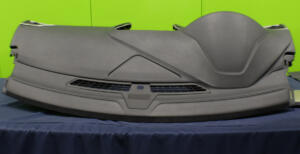
Super High-Flow TPEs Enable Sustainable Solutions for Large Scale Mouldings
Dryflex HiF is a family of very high melt-flow and scratch-resistant TPS-SEBS materials recently launched by HEXPOL TPE. The grades open possibilities to produce large scale parts via injection moulding, including automotive interior surfaces, trims and skins.
Speaking of the development Dr Thomas Köppl, Group Product Manager HEXPOL TPE commented; “There are several processing methods and materials on the market that allow the production of automotive interior surfaces such as instrument panels and door trims. However, these processes can be costly, and the materials are not recyclable. OEMs are looking to improve their sustainability practices while also managing system costs. This is why we developed Dryflex HiF TPE.”
TPE materials are already widely used in automotive interiors, for example in mats, grips and sealings. However, until recently, TPEs have not been viable for large scale trim because these applications have much higher specifications regarding abrasion behaviour, processability and heat resistance. The new Dryflex HiF TPE grades fulfil these requirements and are injection mouldable, making them an interesting alternative to PU coating, PVC slush moulding or TPO foil processes.

In a production trial, 1.1 mm thin skins for the soft surface of a complete instrument panel were moulded and back-foamed with PU, demonstrating that even very large, thin parts can be produced via injection moulding due to the high flowability of the Dryflex HiF TPE.
Testing demonstrates that Dryflex HiF TPEs pass the stringent lightfastness and heat resistance requirements for instrument panels (for example 120°C for 1000 hours). A low-gloss, matt surface with no visible weld lines is achievable as well as the moulding of different leather grains. Surface performance is confirmed by the testing of Erichsen scratch resistance and Crock abrasion.
Injection moulding TPE is a faster process and consumes less energy than materials traditionally used in these applications. For example, producing a skin via PVC slush moulding can take 5 to 6 minutes, whereas an injection moulded TPE skin can take around 80 seconds. The lower density of Dryflex HiF TPEs (0.9 g/cm3) can decrease part weight, helping OEMs to meet light-weighting and CO2 emissions targets. Additionally, TPE materials are recyclable in processing, which all supports the market need for sustainable manufacturing.

Dryflex HiF TPEs can be used in multi-component applications with direct overmoulding to polypropylene. Compared to existing TPU or PU-RIM processes, which often use PC/ABS as the rigid component, the material’s ability to adhere to PP can deliver further cost and weight reduction in 2K processes.
Dr Köppl concluded: “In developing these materials we worked in close collaboration with Kraton Corporation, based on Kraton IMSS™ technology, Dryflex HiF TPEs deliver a combination of high-performance, soft-touch appeal, processing optimisation and recyclability. They are part of our growing portfolio of materials bringing new possibilities to the automotive industry.”
HEXPOL TPE
+44 (0) 161 654 6616
Website
Email






